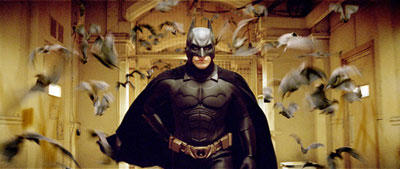
Finally, a Batman movie that understands the character! I have seen Batman Begins twice, now, but I am still mulling it over and, as my deadline is still a few days off, I haven’t written a proper review; in the meantime, here are some of my early impressions.
In 1989, a lot of people went ga-ga for Tim Burton’s film because it was dark and moody and a change of pace from the campy 1960s TV show — but I was very disappointed in it, partly because I had recently started collecting Batman comics myself (beginning with the ‘Death in the Family‘ storyline in which the Joker killed the second Robin), and especially because screenwriter Sam Hamm had written an excellent three-part storyline for Detective Comics #598-600 that was so good, I went into the theatre expecting the movie based on his script to be truly great, and instead all I got was Jack Nicholson dancing with a paintbrush while his henchman carried a boom box blasting Prince tunes. Blecch.
And that’s another thing — Burton, being a freakish, eccentric sort himself, was far more interested in his villains than he was in his hero; a customer at the video store where I worked back then said the film should have been called “Joker”, and I agreed. And this problem plagued all the sequels, too. When Batman Returns (1992) came out, my friend Byrun and I took to calling it “Oswald Flipperhands” because it was so obvious that Burton cared little for Batman himself and even less for the character of the Penguin as he had been developed in any of the other media, but rather, he was exploiting the Batman franchise to recycle ideas he had already explored in Edward Scissorhands (1990). Burton’s films were dark and moody, yes, but they were still camp.
So when Joel Schumacher took over the franchise for Batman Forever (1995) and Batman and Robin (1997) and ran with it in an increasingly silly direction, I didn’t mind at all; I even took the unorthodox position that his films were better than Burton’s, simply because they didn’t make any pretense of greatness, and I even remember calling the last film an “experimental” movie because of the way it boldly actualized all the most ridiculous aspects of some of the comics that I had read. As far as I was concerned, the only movie that had come close to depicting the Batman that I knew was Batman: Mask of the Phantasm (1993), and that was a spin-off from the animated TV show.
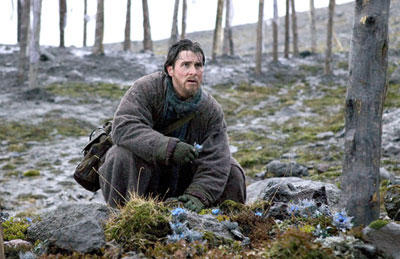 But now, ah, Batman Begins allows us to start anew. And what a promising start it is. For one thing, as Steve Greydanus has pointed out, this film integrates the hero’s origin story with the necessary climactic battle between hero and villain in a way that the original Superman, Spider-Man and even Batman films never did. For another, this movie really is all about Bruce Wayne (Christian Bale) — the villains may loom large, as any suitably menacing or threatening villain does, but ultimately they are only accessories to his story. And because the film deals with them in series, rather than in parallel, we never get the feeling that the villains are bunching up and crowding Batman out of the picture.
But now, ah, Batman Begins allows us to start anew. And what a promising start it is. For one thing, as Steve Greydanus has pointed out, this film integrates the hero’s origin story with the necessary climactic battle between hero and villain in a way that the original Superman, Spider-Man and even Batman films never did. For another, this movie really is all about Bruce Wayne (Christian Bale) — the villains may loom large, as any suitably menacing or threatening villain does, but ultimately they are only accessories to his story. And because the film deals with them in series, rather than in parallel, we never get the feeling that the villains are bunching up and crowding Batman out of the picture.
First, Bruce, who has been wandering the earth for several years, joins an international group of ninja warriors headed by Ra’s al Ghul (Ken Watanabe) and his lieutenant Henri Ducard (Liam Neeson), who not only give Bruce skills but a “path” or purpose into which he can channel his emotions; however, at a crucial moment, Bruce realizes that he does not share their thirst for dishing out merciless judgment — instead, he believes it is compassion that sets the heroes apart from the villains. And so he makes a somewhat violent break with the group that has helped him to become what he is. Second, when Bruce returns to Gotham, he targets the local crime lord Carmine Falconi (Tom Wilkinson). Third, he battles the Scarecrow (Cillian Murphy). And then, finally, a certain villain makes his climactic reappearance.
The fact that Bruce becomes a hero partly under the guidance of a villain — that one of his major father figures is, in fact, a bad guy — opens the door to some intriguing moral ambiguities. What is the nature of justice? What role, if any, is there for forgiveness? What responsibility do we bear for the actions of others?
Bruce has felt guilt over the death of his parents for years, because they left the opera house through a back door when he found the performance of Arrigo Boito’s Mefistofele too scary; if they had not left early, they would not have walked into that alley, and they would not have been killed by the mugger Joe Chill (Richard Brake). The butler Alfred (Michael Caine) tries to assure the young Bruce that it was Chill’s fault, and his alone, that he killed Bruce’s parents, but young Bruce feels the guilt just the same.
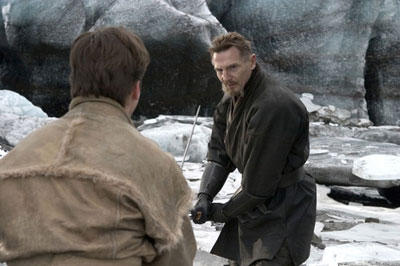 However, Ducard, during one of his training sessions with Bruce, tells him it was his own father’s fault that he died, because he failed to fight back against Chill, and this reminds me of what my own brother told me after I myself was mugged a few years ago; apparently those of us who don’t put up a fight are part of the problem, because we facilitate the success of these crimes and thus encourage the criminals to commit them again. Bruce replies that his father didn’t have the training to fight back, to which Ducard barks in reply, “Training is nothing! Will is everything! The will to act!” Ducard may have a point, but his exaltation of pure will, compounded by his lack of compassion, inevitably brings the Nietzschean likes of Hitler to mind (especially as portrayed in Downfall; my review).
However, Ducard, during one of his training sessions with Bruce, tells him it was his own father’s fault that he died, because he failed to fight back against Chill, and this reminds me of what my own brother told me after I myself was mugged a few years ago; apparently those of us who don’t put up a fight are part of the problem, because we facilitate the success of these crimes and thus encourage the criminals to commit them again. Bruce replies that his father didn’t have the training to fight back, to which Ducard barks in reply, “Training is nothing! Will is everything! The will to act!” Ducard may have a point, but his exaltation of pure will, compounded by his lack of compassion, inevitably brings the Nietzschean likes of Hitler to mind (especially as portrayed in Downfall; my review).
To make things even more complicated, the film does not depict Chill as a nasty brutish lout, but as someone sympathetic, who was driven to desparation by a recent economic depression that hit him pretty hard. Indeed, the film goes beyond even that, to suggest that the depression was caused by the actions of other people. Do those people bear any responsibility for what Chill did? Are they responsible for the deaths of Bruce’s parents?
Another thing I like about the film is the way it avoids the theme of “insanity” — which, admittedly, it is very easy for this franchise to be distracted by, what with Jokers and Riddlers and Two-Faces and whatnot — and focuses instead on the theme of “fear”. The whole point of putting on the batsuit is, after all, to strike fear in the hearts of criminals. And one of the things that makes the drama so compelling is the way that Bruce Wayne must learn to confront his own fears too; the scene of him standing in the cave and letting the bats swarm around him is especially potent here. And it is interesting to see how the film plays with points of view, telling the story primarily from Bruce’s perspective, except when he starts going after the bad guys, at which point the movie turns into a sort of low-key horror film told from their point of view — shadows barely perceived in the distance, rushing past and sweeping people away into the darkness, one at a time.
My wife also liked the theme that comes up a couple times, to the effect that it is not what is inside us that defines us, but what we do. The relationship between faith and actions is an ongoing point of debate for Christians, but suffice to say this was a nice alternative to the pap we get from most films about “listening to our hearts” and the like. Faith without deeds is dead, and all that.
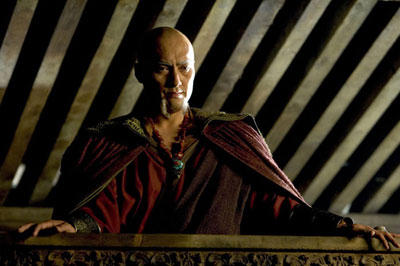 It is impossible these days for any blockbuster to avoid being analyzed for references to the war on terror, and I think this film gives a bit of fodder to both sides. Ra’s al Ghul runs an organization called the League of Shadows, which claims to have sacked, burned, and otherwise destroyed cities like Rome, Constantinople, London and others over the centuries when they reached the pinnacle of their decadence — and Gotham is next on their list; it is therefore easy to imagine that they represent the jihadists who have declared war against the United States. But when the League instructs Bruce to behead a man (another jihadist motif), as a sign of his commitment to justice, Bruce refuses, and says the man should stand trial; suddenly it is possible to imagine that Ra’s al Ghul and his men are stand-ins for the Bush administration and others who have opted to fight terrorism through, um, legally questionable means. (Alas, these plot elements also remind me of Revenge of the Sith, in which Anakin Skywalker beheads one man and then insists another man should stand trial, but at least they are developed here in a way that makes dramatic and thematic sense.)
It is impossible these days for any blockbuster to avoid being analyzed for references to the war on terror, and I think this film gives a bit of fodder to both sides. Ra’s al Ghul runs an organization called the League of Shadows, which claims to have sacked, burned, and otherwise destroyed cities like Rome, Constantinople, London and others over the centuries when they reached the pinnacle of their decadence — and Gotham is next on their list; it is therefore easy to imagine that they represent the jihadists who have declared war against the United States. But when the League instructs Bruce to behead a man (another jihadist motif), as a sign of his commitment to justice, Bruce refuses, and says the man should stand trial; suddenly it is possible to imagine that Ra’s al Ghul and his men are stand-ins for the Bush administration and others who have opted to fight terrorism through, um, legally questionable means. (Alas, these plot elements also remind me of Revenge of the Sith, in which Anakin Skywalker beheads one man and then insists another man should stand trial, but at least they are developed here in a way that makes dramatic and thematic sense.)
There is also a scene in which one of Gotham’s neighbourhoods is flooded with a drug that causes people to see their worst fears, and the Scarecrow, riding a horse that appears to breathe fire — one of many fantastic images in this film — alludes to a famous Franklin D. Roosevelt line by saying the people “have nothing to fear but fear itself.” Given that FDR said this after the bombing of Pearl Harbor, and given that many have likened the attacks of September 11, 2001 to that event, I think that line could also be interpreted as a comment on the current political climate, particularly in the U.S., with its colour-coded threat alerts and whatnot — but it is interesting that the line would be spoken by one of the villains.
So much for the political overtones. I am also wondering what to make of the more mythological overtones. There is a scene where Bruce begs the League of Shadows to put off its plan to destroy Gotham (“Gotham isn’t beyond saving. Give me more time. There are good people here”) and it brought to mind, of all things, Abraham asking God to spare the cities of Sodom and Gomorrah. And then there is the scene where Batman catches and questions a corrupt cop who ends one of his sentences by saying, “I swear to God,” which prompts Batman to growl, “Swear to me!” Is Batman meant to be some sort of heroic, Satanic figure who challenges the judgment of an Old Testament God figure? Or is it possible to read him as more of a Christ figure, a member of Gotham’s social elite who has gone through some sort of kenosis and emptied himself to the point of identifying with the underclass, and who is now worthy, in some way, to impart judgment of his own? Christian Bale has talked about Bruce Wayne’s “Christ-like journey” and about how much he enjoyed playing a “demonic” superhero, and I think that sort of ambiguity is there throughout the film.
I must confess that I have still not yet seen director Chris Nolan’s first film, Following (1998), but Memento (2000; my mainstream review; my Christian review; my article on memory movies) was my favorite film of the year it was released in Vancouver, and I rather liked his remake of Insomnia (2002), too, not only because it was filmed here but because he got such restrained and carefully modulated performances out of Al Pacino and Robin Williams, two actors who have a knack for going way over the top. There are traces of those two films in Batman Begins — the fragile, dreamlike memories of a happy life before one’s loved ones were killed; the epic shot of a glacier over which our protagonist must pass; the sunlight breaking in through the curtains on a person’s effort to sleep; the insistence that justice must be better than mere vengeance; the recognition that good and bad tug for control of the hearts of every person; and so on. But this film is, of course, a much bigger affair, and Nolan acquits himself rather well; there are only a few places in the script, which he co-wrote with David S. Goyer (Dark City, my article; the Blade movies), where the lines seemed just a little too comic-book-ish for my tastes.
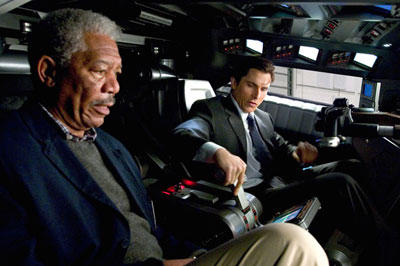 The film also benefits from a terrific supporting cast — including Caine, Morgan Freeman (as gadget developer Lucius Fox) and Gary Oldman (as Sgt. Jim Gordon) — most of whom appear for only a few scenes each, but they do very well with what they’ve got, and they give the film just that extra touch of warmth and humanity. (It’s interesting to see Oldman play yet another nice guy, after playing Sirius Black in the last Harry Potter movie; it was only a few years ago that he seemed to be permanently typecast as the bad guy.) Neeson also cuts an imposing figure, and as the guy who teaches our hero how to use a sword, he fares much better opposite Bale than he did opposite Kingdom of Heaven‘s Orlando Bloom. FWIW, Katie Holmes makes an okay love interest, but she’s still just a little too cutie-pie for my tastes, especially if she’s supposed to be playing a hard-nosed district attorney type. She’s definitely way better than Kim Basinger, though. I also like Linus Roache as Bruce’s father — and for the trivia buffs out there, this film marks the first time Roache and Wilkinson have appeared in the same big-screen movie since the controversial Priest (1994).
The film also benefits from a terrific supporting cast — including Caine, Morgan Freeman (as gadget developer Lucius Fox) and Gary Oldman (as Sgt. Jim Gordon) — most of whom appear for only a few scenes each, but they do very well with what they’ve got, and they give the film just that extra touch of warmth and humanity. (It’s interesting to see Oldman play yet another nice guy, after playing Sirius Black in the last Harry Potter movie; it was only a few years ago that he seemed to be permanently typecast as the bad guy.) Neeson also cuts an imposing figure, and as the guy who teaches our hero how to use a sword, he fares much better opposite Bale than he did opposite Kingdom of Heaven‘s Orlando Bloom. FWIW, Katie Holmes makes an okay love interest, but she’s still just a little too cutie-pie for my tastes, especially if she’s supposed to be playing a hard-nosed district attorney type. She’s definitely way better than Kim Basinger, though. I also like Linus Roache as Bruce’s father — and for the trivia buffs out there, this film marks the first time Roache and Wilkinson have appeared in the same big-screen movie since the controversial Priest (1994).
Like I say, I’m still mulling this film over. I may post additional thoughts here as they come to me. Stay tuned.
JUNE 16 UPDATE: Some more thoughts occur to me, as I page through the Batman books that I acquired over a dozen years ago.
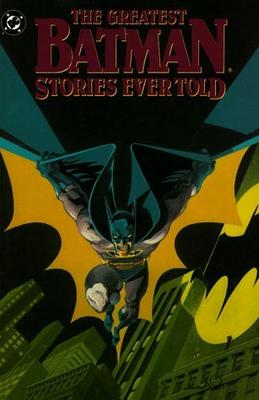 I am particularly impressed by the way this film incorporates elements from the existing mythos, even as it tweaks them to suit its own narrative purposes. On pages 66-78 of The Greatest Batman Stories Ever Told, a compilation published in 1989, there is a reprint of ‘The Origin of Batman’ from Batman #47 (1948), in which Bruce Wayne discovers that the man who killed his parents is a gangster named Joe Chill, who now smuggles criminals across state boundaries. After trying in vain to catch the guy committing a crime, Batman finally resorts to confronting Chill, removing his cowl and telling him he’ll always be watching him. Chill, scared, runs to some other gangsters and asks them for help, but when they find out that Chill is somehow responsible for the superhero who has thwarted so many of their crimes, they kill Chill — and then they go, “Whoops, we forgot to find out from him what Batman’s real name is.” Then Batman swoops in and knocks them all out. His secret is safe, and the case of his father’s murder is finally closed. End of story.
I am particularly impressed by the way this film incorporates elements from the existing mythos, even as it tweaks them to suit its own narrative purposes. On pages 66-78 of The Greatest Batman Stories Ever Told, a compilation published in 1989, there is a reprint of ‘The Origin of Batman’ from Batman #47 (1948), in which Bruce Wayne discovers that the man who killed his parents is a gangster named Joe Chill, who now smuggles criminals across state boundaries. After trying in vain to catch the guy committing a crime, Batman finally resorts to confronting Chill, removing his cowl and telling him he’ll always be watching him. Chill, scared, runs to some other gangsters and asks them for help, but when they find out that Chill is somehow responsible for the superhero who has thwarted so many of their crimes, they kill Chill — and then they go, “Whoops, we forgot to find out from him what Batman’s real name is.” Then Batman swoops in and knocks them all out. His secret is safe, and the case of his father’s murder is finally closed. End of story.
One of many things I always hated about Burton’s film was the way it showed Batman’s parents being killed by the man who became the Joker. One critic remarked at the time that this gave the film a revenge-themed climax — a climax that might have undermined the likelihood that Batman would continue with his crimefighting once the Joker was dead. Suffice to say Nolan’s film avoids that pitfall wonderfully, in a way that heightens his moral themes.
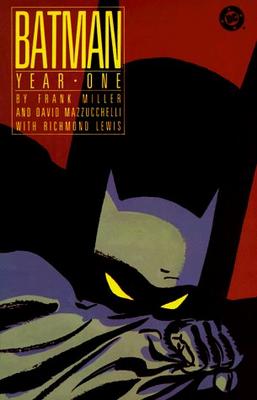 FWIW, I also flipped through Frank Miller and David Mazzucchelli’s Batman: Year One (1988) and realized that Gordon’s corrupt partner in that story is also named Flass, just like the guy in the movie. (BTW, did you notice that Flass is played by the same guy who played the motel manager in Nolan’s earlier film Memento?)
FWIW, I also flipped through Frank Miller and David Mazzucchelli’s Batman: Year One (1988) and realized that Gordon’s corrupt partner in that story is also named Flass, just like the guy in the movie. (BTW, did you notice that Flass is played by the same guy who played the motel manager in Nolan’s earlier film Memento?)
I was also reminded that, for some years at any least, the tradition has been that the Waynes went to see a Zorro movie the night that Joe Chill killed Bruce’s parents; one masked hero inspired another. So what significance is there, I wonder, in the fact that this film has the Waynes going to see an opera about the demonic underworld on the night of their murder? Instead of being inspired by another masked hero, is Bruce Wayne being inspired in some way by, um, Satan?
For that matter, what significance might there be in the fact that a comic shows the character getting his inspiration from a movie, but a movie shows him getting his inspiration from an opera? Would it have been too self-consciously cinematically intertextual if the movie had depicted another movie, I wonder? Or does this reflect the way “low” culture tends to aspire to “higher” culture?
UPPERDATE: Ken Ristau makes some interesting comments too, including one parallel between Batman Begins and the Star Wars prequels that had not yet occurred to me. Namely, Liam Neeson plays the mentor figure in this film just as he did in Episode I (my review), and here he tells Bruce Wayne, “Mind your surroundings,” just as he gave Anakin Skywalker, Obi-Wan Kenobi, or both such aphoristic instructions as, “Don’t lose sight of the moment.”












